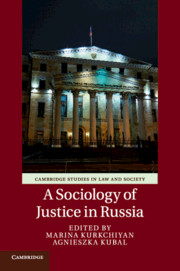Crossref Citations
This Book has been
cited by the following publications. This list is generated based on data provided by Crossref.
2018.
Law's Trials.
p.
831.
2018.
Children as ‘Risk'.
p.
357.
Kubal, Agnieszka
2019.
Immigration and Refugee Law in Russia.
2019.
Genocide Never Sleeps.
p.
219.
BUTLER, WILLIAM ELLIOTT
2019.
What Makes Socialist Legal Systems Socialist?.
Право України,
p.
131.
2019.
Book Notes.
Law & Social Inquiry,
Vol. 44,
Issue. 1,
p.
299.
2020.
Transnational Legal Ordering of Criminal Justice.
p.
386.
Ruiz-Tagle, Pablo
2021.
Five Republics and One Tradition.
Dzmitryieva, Aryna
2021.
Becoming a Judge in Russia: An Analysis of Judicial Biographies.
Europe-Asia Studies,
Vol. 73,
Issue. 1,
p.
131.
2021.
Five Republics and One Tradition.
p.
306.
2021.
Shari‘a, Inshallah.
p.
363.
2021.
Rule of Law Intermediaries.
p.
255.
2021.
The Law Multiple.
p.
206.
Reisinger, William M.
Zaloznaya, Marina
and
Claypool, Vicki L. Hesli
2021.
Popular Legal Attitudes and the Political Order: Comparative Evidence from Georgia, Russia and Ukraine.
Europe-Asia Studies,
Vol. 73,
Issue. 1,
p.
36.
2021.
The Archival Politics of International Courts.
p.
227.
2022.
Anti-Constitutional Populism.
p.
550.
2022.
The Sentimental Court.
p.
234.
2022.
The Practice and Problems of Transnational Counter-Terrorism.
p.
224.
2022.
Global Pro Bono.
p.
730.
2024.
The Regulation of Prostitution in China.
p.
408.



